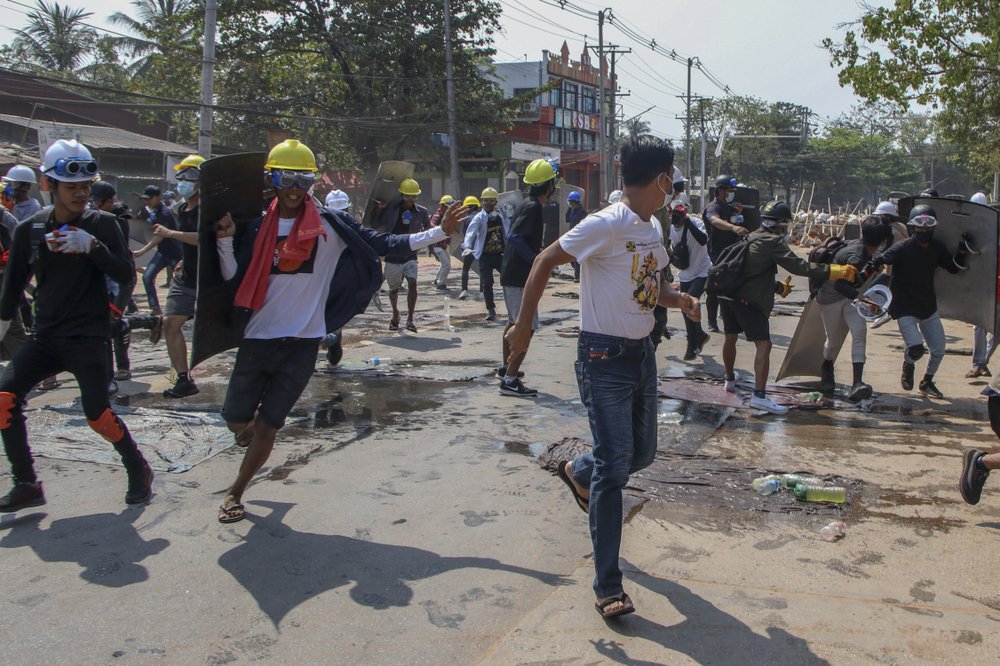

Amnesty International accused Myanmar’s military government on Thursday of increasingly using battlefield weapons against peaceful protesters and conducting systematic, deliberate killings.
Myanmar has been roiled by protests and other acts of civil disobedience since a Feb. 1 military coup that toppled the elected government of Aung San Suu Kyi just as it was to start its second term. The coup reversed years of slow progress toward democracy in the Southeast Asian nation after five decades of military rule.
The military “is using increasingly lethal tactics and weapons normally seen on the battlefield against peaceful protesters and bystanders across the country,” Amnesty International said in a report.
“By verifying more than 50 videos from the ongoing crackdown, Amnesty International’s Crisis Evidence Lab can confirm that security forces appear to be implementing planned, systematic strategies including the ramped-up use of lethal force. Many of the killings documented amount to extrajudicial executions,” the report said.
Security forces have used live ammunition against protesters, causing the deaths of about 60 people.
There were new but unconfirmed accounts of additional deaths Wednesday and Thursday as police attempted to break up anti-coup protests in cities and towns across the country using tear gas and other weapons.
As widespread protests against its takeover continue, the junta is facing a new challenge from the country’s ethnic guerrilla forces, which until recently had limited themselves to verbal denunciations of last month’s coup.
Reports from Kachin, the northernmost state, said guerrilla forces from the Kachin ethnic minority attacked a government base on Thursday and were in turn attacked. The armed wing of the Kachin political movement is the Kachin Independence Army, or KIA.
“This morning in Hpakant township, the Kachin Independence Organization (KIO/KIA) attacked a military council battalion based in Sezin village, and the KIO/KIA’s Hpakant-based 9th Brigade and 26 battalions were attacked by helicopter. Both sides are still investigating,” The 74 Media reported on Twitter.
A Facebook page for the Kachin Liberation Media said the KIA had overrun the government outpost and seized ammunition. It warned the government against using lethal force to break up anti-coup protests in the Kachin capital, Myitkyina, where two demonstrators were killed this week.
The reports could not be independently confirmed, and ethnic guerrilla armies as well as the government often release exaggerated information. However, even making such an announcement amounts to a sharp warning to the government.
The Kachin actions come a few days after another ethnic guerrilla force belonging to the Karen minority announced it would protect demonstrators in territory it controlled. The Karen National Union deployed armed combatants to guard a protest in Myanmar’s southeastern Tanintharyi Region.
Myanmar has more than a dozen ethnic guerrilla armies, mostly in border areas, a legacy of decades-old struggles for greater autonomy from the central government. Many have formal or informal cease-fire agreements with the government, but armed encounters still occur.
There has been speculation that some ethnic groups could form a de facto alliance with the protest movement to pressure the government.
The U.N. Security Council on Wednesday unanimously called for a reversal of the military coup that ousted Suu Kyi’s government and strongly condemned the violence against peaceful protesters. The council also called for “utmost restraint” by the military.
A presidential statement approved by all 15 council members was formally adopted at a virtual meeting. The British-drafted statement calls for the immediate release of leaders including Suu Kyi and President Win Myint who have been detained since the army’s takeover. It supports the country’s democratic transition and “stresses the need to uphold democratic institutions.”
The United States on Wednesday announced sanctions on two adult children of Myanmar’s junta chief, Senior Gen. Min Aung Hlaing. They are the latest in a series of sanctions imposed by the U.S. since the military seized power and began its deadly crackdown on protesters. Secretary of State Antony Blinken said Myanmar’s military leaders should not be able “to derive benefits from the regime as it resorts to violence and tightens its stranglehold on democracy.”